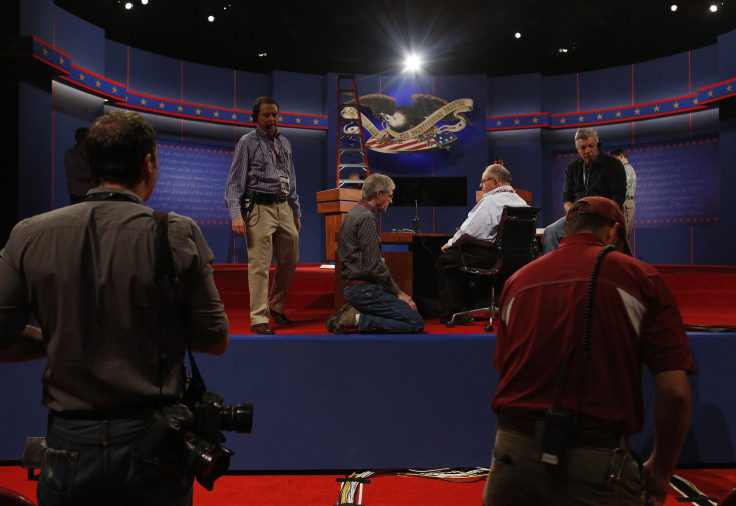US Presidential Debate: 5 Things To Watch For

The quadrennial White House marathon is entering its final stretch, with President Barack Obama and Republican challenger Mitt Romney set to face off in Denver Wednesday evening in the first of three debates.
While many voters' impressions have solidified to the point that the debates are unlikely to drastically alter the outcome of the election, the debates still represent the most prominent platform on which both candidates will get to make their case before Election Day. The stakes are particularly high for Romney, whose faltering campaign is lagging behind Obama in the polls. Here are five things to watch for:
1. The economy's past versus the economy's future: Romney's campaign is founded on two interwoven premises: that an uneven economic recovery means Obama has failed, and that Romney is better equipped to restore America's prosperity. The relentless focus on a still-stalled economy has animated Romney's campaign, so look for him to marshal data about jobs, income and how Americans are faring little better -- if at all -- than they were four years ago.
Obama will take the opposite approach: attempting to convince voters that, while the recovery has been frustratingly slow, a Romney presidency would make things worse. Obama's standard argument suggests that Romney is embracing discredited economic policies that will benefit the rich while the middle class stagnates.
Expect Obama to stress this point while offering an alternate vision of a federal government with an active role investing in research, education, infrastructure and health care -- as exemplified by the American Recovery and Reinvestment Act, the $789 billion stimulus package that has become a target of Republican animosity.
2. Obamacare versus Romneycare: Romney has had to strike a tenuous balance in repudiating the Affordable Care Act while standing by its model, a Massachusetts health care law that he, as governor, enthusiastically supported and signed. Romney was able to evade the issue during the Republican primaries by insisting that the Massachusetts law was not appropriate for the entire country, but look for Obama to call him on that.
Both laws share the essential mechanism of an individual mandate, which gives insurance companies an incentive to cover everyone by ensuring that people don't wait to get sick to buy insurance. Romney appears to have come full circle on this issue, suggesting during an interview last week on "60 Minutes" that emergency room care is sufficient.
3. Who's hurting Medicare: Speaking of health care, count on a question about the cherished government-run insurance program for the elderly. Romney elevated the debate over Medicare's future by selecting as his running mate Rep. Paul Ryan, a Republican budget expert whose plan to convert some of Medicare into vouchers for purchasing private insurance would, the Obama team charges, "end Medicare as we know it."
Of course, Romney and his allies have made the same claim about Obama's health care overhaul. The Affordable Care Act looks for billions in savings by trying to hold down Medicare payments to health care providers, which Romney has said is tantamount to "raiding" Medicare in order to pay for the law.
4. Immigration: This issue has mostly flown under the radar since provoking some of the more volatile moments in the Republican primary (see Texas Gov. Rick Perry's ill-advised statement that those who would deny certain benefits to young immigrants have "no heart"). But the topic has re-emerged now that Obama has unveiled a program, Deferred Action for Childhood Arrivals, that allows undocumented immigrants who were brought to the country as children to apply for a reprieve from deportation and a work permit.
The program is modeled on the DREAM Act, a failed bill that would have provided those same young immigrants with a path to citizenship -- and that Romney has sworn to veto. Although Romney recently clarified that he would not rescind permits issued under the Deferred Action program, his hard line on immigration has damaged his standing among Latino voters, a demographic in which Obama leads by a significant margin.
Romney knows how important this voting bloc is -- earlier this year, he told supporters that the Republican Party's difficulty winning over Hispanics "spells doom" at the ballot box -- so look for him to try and walk a narrow line, most likely by criticizing Obama for not pursuing comprehensive immigration reform legislation.
5. Romney gaffes, Obama coldness: Romney has a well-established penchant for poorly chosen words that help cement the perception that he is awkward and out of touch. If Obama manages to rattle Romney and get him out of his comfort zone, there could be another cringe-inducing moment -- like the infamous $10,000 bet with Perry -- that would make Obama appear personable and at ease by comparison.
At the same time, Obama has his own history of appearing aloof or condescending, like his attempt to reassure Hillary Clinton in New Hampshire that she was "likable enough." He will need to appear intelligent without becoming too professorial, confident but not arrogant.
© Copyright IBTimes 2024. All rights reserved.





















